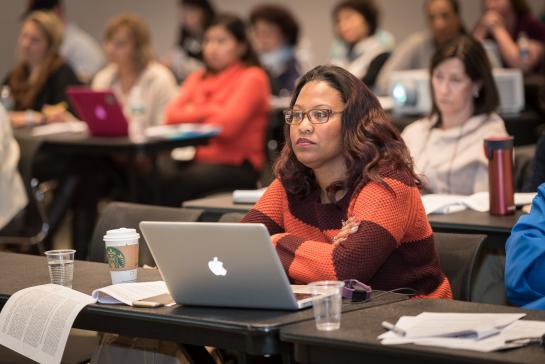Advanced Special Education Preparation Standards

About Our Advanced Preparation Standards
As special educators progress in their teaching careers, many seek to deepen their skills and broaden their knowledge base through advanced study in classroom or specialty areas. Others choose to pursue new roles with special education. The Council for Exceptional Children (CEC) applauds these efforts, which is why we developed Preparation Standards for Advanced Programs.
Because of the varied nature of these roles, the standards can be very different. But, in general, the advanced preparation programs should address (as appropriate to the role):
- Assessment
- Content knowledge
- Program, services, and outcomes
- Research and inquiry
- Leadership and policy
- Professional and ethical practice
- Collaboration
The webinar below has passed, but a recording of the presentation is available. Click the "Read More" button for details.
Advanced Standards Webinar
Advanced Preparation Standards
| Advanced Preparation Standard 1: Assessment | |
|---|---|
| 1.0 | Special education specialists use valid and reliable assessment practices to minimize bias. |
Key Elements
| 1.1 | Special education specialists minimize bias in assessment. |
| 1.2 | Special education specialists design and implement assessments to evaluate the effectiveness of practices and programs. |
| Advanced Preparation Standard 2: Curricular Content Knowledge | |
|---|---|
| 2.0 | Special education specialists use their knowledge of general and specialized curricula to improve programs, supports, and services at classroom, school, community, and system levels. |
Key Elements
| 2.1 | Special education specialists align educational standards to provide access to challenging curriculum to meet the needs of individuals with exceptionalities. |
| 2.2 | Special educators continuously broaden and deepen their professional knowledge and expand their expertise with instructional technologies, curriculum standards, effective teaching strategies, and assistive technologies to support access to and learning of challenging content. |
| 2.3 | Special education specialists use understanding of diversity and individual learning differences to inform the selection, development, and implementation of comprehensive curricula for individuals with exceptionalities. |
| Advanced Preparation Standard 3: Programs, Services, and Outcomes | |
|---|---|
| 3.0 | Special education specialists facilitate the continuous improvement of general and special education programs, supports, and services at the classroom, school, and system levels for individuals with exceptionalities. |
Key Elements
| 3.1 | Special education specialists design and implement evaluation activities to improve programs, supports, and services for individuals with exceptionalities. |
| 3.2 | Special education specialists use understanding of cultural, social, and economic diversity and individual learner differences to inform the development and improvement of programs, supports, and services for individuals with exceptionalities. |
| 3.3 | Special education specialists apply knowledge of theories, evidence-based practices, and relevant laws to advocate for programs, supports, and services for individuals with exceptionalities. |
| 3.4 | Special education specialists use instructional and assistive technologies to improve programs, supports, and services for individuals with exceptionalities. |
| 3.5 | Special education specialists evaluate progress toward achieving the vision, mission, and goals of programs, services, and supports for individuals with exceptionalities. |
| Advanced Preparation Standard 4: Research and Inquiry | |
|---|---|
| 4.0 | Special education specialists conduct, evaluate, and use inquiry to guide professional practice. |
Key Elements
| 4.1 | Special education specialists evaluate research and inquiry to identify effective practices. |
| 4.2 | Special education specialists use their knowledge of the professional literature to improve practices with individuals with exceptionalities and their families. |
| 4.3 | Special education specialists foster an environment that is supportive of continuous instructional improvement and engage in the design and implementation of research and inquiry. |
| Advanced Preparation Standard 5: Leadership and Policy | |
|---|---|
| 5.0 | Special education specialists provide leadership to formulate goals, set and meet high professional expectations, advocate for effective policies and evidence-based practices, and create positive and productive work environments. |
Key Elements
| 5.1 | Special education specialists model respect and ethical practice for all individuals and encourage challenging expectations for individuals with exceptionalities. |
| 5.2 | Special education specialists support and use linguistically and culturally responsive practices. |
| 5.3 | Special education specialists create and maintain collegial and productive work environments that respect and safeguard the rights of individuals with exceptionalities and their families. |
| 5.4 | Special education specialists advocate for policies and practices that improve programs, services, and outcomes for individuals with exceptionalities. |
| 5.5 | Special education specialists advocate for the allocation of appropriate resources for the preparation and professional development of all personnel who serve individuals with exceptionalities. |
| Advanced Preparation Standard 6: Professional and Ethical Practice | |
|---|---|
| 6.0 | Special education specialists use foundational knowledge of the field and professional ethical principles and practice standards to inform special education practice, engage in lifelong learning, advance the profession, and perform leadership responsibilities to promote the success of professional colleagues and individuals with exceptionalities. |
Key Elements
| 6.1 | A comprehensive understanding of the history of special education, legal policies, ethical standards, and emerging issues informs special education specialist leadership. |
| 6.2 | Special education specialists model high professional expectations and ethical practice, and create supportive environments that safeguard the legal rights and improve outcomes for individuals with exceptionalities and their families. |
| 6.3 | Special education specialists model and promote respect for all individuals and facilitate ethical professional practice. |
| 6.4 | Special education specialists actively participate in professional development and professional learning communities to increase professional knowledge and expertise. |
| 6.5 | Special education specialists plan, present, and evaluate professional development focusing on effective and ethical practice at all organizational levels. |
| 6.6 | Special education specialists actively facilitate and participate in the preparation and induction of prospective special educators. |
| 6.7 | Special education specialists actively promote the advancement of the profession. |
| Advanced Preparation Standard 7: Collaboration | |
|---|---|
| 7.0 | Special education specialists collaborate with stakeholders to improve programs, services, and outcomes for individuals with exceptionalities and their families. |
Key Elements
| 7.1 | Special education specialists use culturally responsive practices to enhance collaboration. |
| 7.2 | Special education specialists use collaborative skills to improve programs, services, and outcomes for individuals with exceptionalities. |
| 7.3 | Special education specialists collaborate to promote understanding, resolve conflicts, and build consensus for improving programs, services, and outcomes for individuals with exceptionalities. |
Download the Advanced Preparation Standards
Download the Advanced Preparation Standards with full research explanations.

